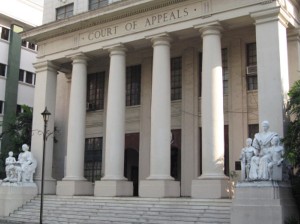MANILA, Philippines— The Department of Energy (DoE) cannot temporarily take over operations of the oil industry in times of emergency, the Court of Appeals said as it dismissed the appeal filed by the government.
In an 11-page decision released Monday by the Appeals Court 9th Division written by Associate Justice Socorro Inting, it affirmed the Makati court’s ruling that Section 14 (e) of Republic Act 8479 or the Downstream Oil Industry Deregulation Act of 1998 is unconstitutional.
The court said the provision has given the DoE “unbridled power…to perform essential acts which only the Congress is constitutionally mandated to perform.”
The case stemmed when Pilipinas Shell and Petroleum Corporation questioned before the Makati City Regional Trial Court the order issued by then President Gloria Macapagal-Arroyo mandating an oil price freeze after the country was hit by typhoons “Ondoy” and “Pepeng” in 2009.
Arroyo’s order was issued pursuant to Section 14 (e) of the Oil Deregulation Law. The provision states that “in times of national emergency, when the public interest so requires, the DoE may, during the emergency and under reasonable terms prescribed by it, temporary take over or direct the operation of any person or entity engaged in the industry.”
The Makati Court ruled in favor of Shell declaring Section 14 (e) as void and unconstitutional.
The lower court’s ruling prompted the Department of Energy-Department of Justice Joint Task Force through the Office of the Solicitor-General to elevate the case to the Court of Appeals.
The appeals court, in dismissing the government’s appeal, cited the Supreme Court ruling in the case of David et. al. v. Arroyo which pointed out that the exercise of emergency powers such as the taking over of privately owned public utility or business affected with public interest like the oil industry requires Congress’ nod first.
In this case however, the appeals court said Section 14(e) of the Oil Deregulation Law as well as the order issued by Arroyo showed that it was the President who determined the existence of emergency instead of Congress as required under the Constitution.
“Clearly, the power to determine whether the exceptional circumstances exist to warrant the power to take-over or direct the operation of businesses affected with public interest such as the oil industry is reposed upon Congress.”
Also, the appeals court told government lawyers that they used the wrong mode of appeal when they questioned the ruling of the Makati court.
The government, the appeals court said, should have taken the case straight to the Supreme Court since it involved a pure question of law.
